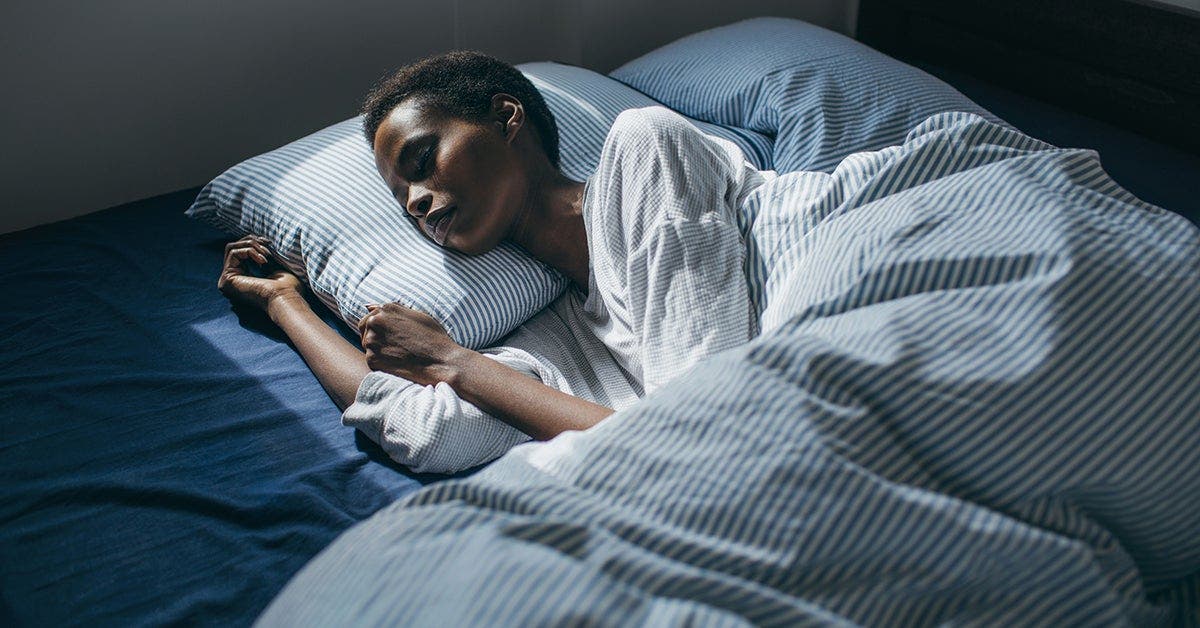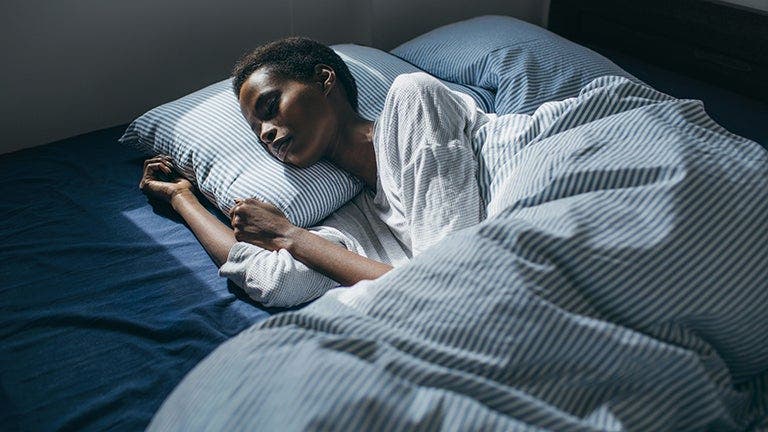Melatonin: Are the potential sleep benefits worth the side effects?


For optimal health and well-being, most adults need seven to nine hours of sleep a night. In the U.S., about 35% of us fall below that threshold, with up to 70 million experiencing regular sleep problems such as insomnia. Understandably, many sufferers want relief. Research suggests that people who get suboptimal sleep are more likely to experience challenges with weight management, mental performance, and more. Over the long term, sleep loss may raise a person’s risk of developing health conditions such as heart disease, depression, and cancer.
In hopes of getting better sleep, many Americans have considered taking a melatonin supplement. This is a synthetic form of the body’s naturally occurring melatonin, a hormone produced in the brain that helps regulate sleep-wake cycles. Melatonin use more than doubled among adults between 2007 and 2012, according to the Centers for Disease Control and Prevention (CDC).
But does melatonin really work to improve sleep? Here’s what you need to know about the popular supplement, including when it might help and how to take it safely.
What is melatonin, and how does it work?
Melatonin, commonly referred to as “the sleep hormone,” is produced naturally in the brain’s pineal gland. It helps regulate the body’s circadian clock (24-hour sleep-wake cycle), helping you fall asleep at night and wake up in the morning.
The body’s production of melatonin rises as day transitions to night—a biological response to fading light levels, says Ellen Vora, MD, a holistic psychiatrist who frequently counsels patients on natural ways to improve sleep quality. In the morning, melatonin production decreases in response to daytime light exposure, which helps you wake up.
That’s not to say melatonin works like a sedative. “Melatonin is not exactly a hormone that increases sleep; it’s a hormone that tells the body what time of day it is,” Dr. Vora says.
Certain factors can impair the body’s production of melatonin and interfere with sleep. Nighttime exposure to the light of smartphone screens, TVs, and certain lightbulbs is one. Age is another factor. “As we age, the production level of melatonin tends to go down, which could be why some older folks tend to have difficulty falling asleep and maintaining sleep,” says Kannan Ramar, MD, a sleep physician at the Mayo Clinic and president-elect of the American Academy of Sleep Medicine (AASM).

Taking melatonin for sleep
The research is mixed on the effectiveness of melatonin supplements for sleep. The data is also inconclusive on when and where melatonin might best be used, Ramar says.
That said, short-term use of melatonin—under three months—generally appears to be safe, and some research suggests that people with certain types of sleep disorders may benefit from taking a supplement, provided they take it at the right time, at the appropriate dose, and for the specific issue they’re addressing.
Because melatonin tells your body what time of day it is, it may be helpful in alleviating sleep problems associated with an out-of-sorts body clock, such as jet lag or delayed sleep disorder. It may also be beneficial in helping older adults get better sleep.
Here’s a closer look at the research on melatonin for a variety of sleep-related issues, along with any available details on dosage and timing.
1. Insomnia
When it comes to melatonin’s ability to alleviate insomnia—a sleep disorder characterized by trouble falling asleep, staying asleep, or both—the jury is out. A 2013 meta-analysis found that subjects with insomnia who took melatonin fell asleep about seven minutes faster, slept longer, and had better overall sleep quality than those who took a placebo. But other research, such as a small 2003 study of patients with primary insomnia published in the Journal of Psychiatry & Neuroscience, found no benefit.
Currently, the AASM does not recommend melatonin supplements for chronic insomnia, given the dearth of strong evidence on long-term effectiveness or safety. For occasional, short-term bouts of insomnia, Dr. Ramar says melatonin may provide some relief.
His general recommended dose: Up to 5 mg of melatonin about a half hour before your intended bedtime. Consider starting with just 1 mg, he suggests, and working your way up toward the 5 mg cap as needed.
2. Jet lag
When traveling across time zones, many people experience jet lag, a disruption to the body’s internal clock that can make falling asleep (and waking up) in accordance with local time difficult. A 2014 research review found that melatonin may be better than placebo at alleviating jet lag after both eastward and westward flights.
No universal strategy exists for managing jet lag with melatonin. Dr. Vora prefers a preventive approach: Starting three days before your flight and using the local time at your destination as a guide, take 0.5 mg of melatonin 30 minutes before your future bedtime. “That way, you’re telling your body in advance what your ‘new nighttime’ is going to be, so you’ll have a little less adjusting to do once you arrive,” Dr. Vora says.
3. Shift work disorder
If your job requires you to work the overnight shift, you may find yourself struggling to fall asleep when you need to—that is, during the day. Could a melatonin supplement help you drift off? To date, studies on shift work and melatonin have been small or inconclusive, according to the National Institutes of Health (NIH). For example, one 2014 research review found that workers with nontraditional hours who took melatonin after a shift slept about 24 minutes longer than those who took a placebo. That said, only 263 subjects were studied, and factors such as the time it took to fall asleep were no different between groups. The researchers described their findings in support of melatonin as “low-quality evidence.”
If you are experiencing signs of shift work disorder—a chronic disturbance in sleep patterns resulting from a nontraditional work schedule—speak with your doctor about ways to manage and improve your sleep.
4. Delayed sleep disorder
Delayed sleep disorder, or delayed sleep-wake phase disorder (DSWPD), occurs when the body clock tells a person to fall asleep later and wake up later than they’d like to—think, sleeping from 3 a.m. to 11 a.m. For people wanting to transition to an earlier sleep schedule, supplementing with melatonin may be helpful, Ramar says.
While evidence is mixed, it leans toward the positive. “There’s some data that suggests one could take a [standard] dose of melatonin—usually 0.1 mg to 0.5 mg, at the most—about four to five hours before the desired sleep time,” Dr. Ramar explains. So if you’re prone to lying awake until 2 a.m. when you really want to be asleep by 10 p.m., taking melatonin between 5 and 6 p.m. may help.
Benefits of melatonin beyond sleep
In addition to the potential sleep-related benefits of melatonin, some preliminary studies suggest that the supplement form may be helpful for coping with other health concerns. More research is needed to say for sure. It’s important to speak with your doctor about using melatonin for any of the following reasons.
1. Melatonin as an antioxidant
A number of studies support the claim that melatonin has antioxidant properties. The hormone is known to combat oxidative damage within cells and tissues and stimulate the production of enzymes that metabolize free radicals. It’s also been shown to exhibit anti-inflammatory properties.
2. Melatonin and tinnitus
Some research indicates that melatonin may help alleviate tinnitus, the sensation of constant or intermittent ringing or buzzing in one or both ears. Tinnitus can result from hearing damage, underlying conditions such as high blood pressure, or use of certain medications, such as aminoglycoside antibiotics.
In one small study, patients receiving 3 mg of melatonin nightly for one month experienced a significant reduction in tinnitus symptoms compared with a placebo group, while another study found that melatonin was up to 150 times more effective at reducing tinnitus symptoms caused by aminoglycoside antibiotics and cancer chemotherapy drugs than another treatment.
3. Melatonin and cancer
According to a 2017 research review in the journal Oncotarget, melatonin may have anti-cancer properties. The bulk of research to date is on melatonin and breast cancer. Melatonin has been shown to have antiproliferative effects on breast cancer cells in lab studies, inhibit the growth of mammary tumors in rats, and induce apoptosis (programmed cancer cell death).
Note, however, that the NIH cautions that studies on melatonin and cancer have been mixed and that melatonin has the potential to interfere with standard cancer treatments.
4. Melatonin and gut health
Some studies suggest that melatonin’s antioxidant properties can help alleviate stomach ulcers and heartburn. One small study of 36 volunteers determined that melatonin might protect the gastrointestinal mucosa from oxidative damage and help alleviate symptoms of GERD, including heartburn, both alone and in combination with the medication omeprazole.
Another small study, this one involving 42 subjects, found that this same combination led to faster healing of stomach ulcers caused by H. pylori bacteria than treatment with omeprazole alone. However, more research is needed to demonstrate just how effective melatonin is for treating gut-related health issues.
5. Melatonin and eye health
Since the body’s melatonin output tends to decline with age, older adults who take a supplement might get a measure of relief from age-related vision disorders. In a preliminary case study, volunteers with age-related macular degeneration who took 3 mg of melatonin per day over the course of several months seemed to experience a delay in the usual development of vision problems. Melatonin also seemed to have protective effects on the retina. More research is needed, particularly on the long-term use of melatonin that would likely be needed in such cases.

Side effects of melatonin
While melatonin supplements mimic a hormone naturally found in the body, researchers have yet to draw definitive conclusions about any side effects associated with extended use.
Short-term use of under three months appears to be safe, according to the NIH. A 2015 review on the safety of melatonin supplements published in the journal Clinical Drug Investigation found that mild adverse side effects can include:
- Headache
- Dizziness
- Nausea
- Sleepiness
If you’re currently taking any medications or other supplements, it’s best to check with your doctor for potential interactions before incorporating melatonin into your lifestyle. Melatonin may have negative interactions with blood thinners, blood pressure medications, contraceptives, diabetes medications, immunosuppressants, and other drugs, according to the Mayo Clinic.
Melatonin is the only hormone available in the U.S. as an over-the-counter supplement because it’s naturally found in certain foods, most notably tart cherries. Unlike drugs, melatonin supplements are not subject to safety and quality-control oversight by the Food and Drug Administration (FDA). A 2017 AASM analysis of 31 melatonin supplements found that 71% of products contained melatonin amounts that were significantly different from the amounts stated on labels—some had much more, some much less.
If you decide to take a melatonin supplement, look for a seal denoting third-party verification, such as “USP Verified,” which indicates that the brand has been independently tested to help ensure its labeling is accurate.
Is melatonin safe for kids?
An estimated 15% to 25% of kids have trouble falling and staying asleep, according to the American Academy of Pediatrics (AAP). Over time, children who experience regular sleep loss may have difficulty paying attention in school, complain of headaches, or experience weight gain. According to a CDC survey, approximately 419,000 children in the U.S. took melatonin as of 2012.
The AAP holds that melatonin may help some children snooze more soundly with short-term use, but only in conjunction with good sleep practices. Maintaining a consistent bedtime, free of electronics for at least one hour prior to sleep, may help kids sleep.
Before allowing your child to take melatonin, have a discussion with their doctor about appropriate timing and dosage. The AAP notes that very low doses (0.5 mg or 1 mg, 30 to 90 minutes before bedtime) might be sufficient.
Other potential benefits of melatonin in kids
Research hints at some potential sleep benefits of melatonin for children with neurodevelopmental disorders. A 2011 literature review in the International Journal of Pediatrics found that melatonin may improve sleep in kids living with attention-deficit hyperactivity disorder (ADHD) or autism. In these cases, the AAP emphasizes that melatonin’s use should be carefully monitored by the child’s pediatrician.
Side effects of melatonin in kids
Though melatonin supplements seem safe for most children when taken for a limited period of time, less is known about long-term use. Because melatonin is a hormone, it's possible—though not proven—that the supplement could negatively affect growth and development, especially during puberty, according to the NIH.
The upshot: Should you take melatonin?
Melatonin supplements are a popular over-the-counter remedy among people seeking better sleep. Research suggests that melatonin may be helpful in optimizing the internal body clock (circadian rhythm) and promoting better rest, particularly for adults dealing with jet lag, delayed sleep disorder, or a short-term bout of insomnia.
Overall, however, research supporting melatonin’s use is mixed, and side effects are possible. Melatonin’s effect on non-sleep-related conditions (such as tinnitus and cancer) is not yet clear or well-established.
Practicing good sleep hygiene is an important part of improving sleep for both adults and children. Examples of sleep-promoting habits include maintaining a consistent bedtime, getting exposure to light during the day, and limiting exposure to the light of electronics in the hour or so prior to bedtime.
If you decide you'd like to take melatonin, consult with your doctor first. Ask for your doctor's recommended brand, or shop for a supplement with a third-party seal for quality.
--
This article was reviewed for accuracy in July 2021 by Stephanie L. Fitzpatrick, PhD, senior manager for multicultural programs at WeightWatchers®. The WW Science Team is a dedicated group of experts who ensure all our solutions are rooted in the best possible research.
Related articles
